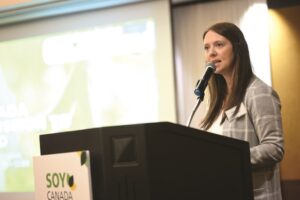Advancing field crop research
NEW UOFG PROFESSORS TAKE ON INDUSTRY CHALLENGES

LIKE MANY YOUNG PEOPLE WITH A KEEN INTEREST IN AGRICULTURAL RESEARCH, Dr. Gursahib Singh, a pathologist recently appointed to fill the Grain Farmers of Ontario Professorship in Research Pathology at the University of Guelph Ridgetown Campus, got his start on his family farm in India. Pursuing an undergraduate degree in agriculture was a natural career path; choosing plant pathology as a specialty was rooted in the challenges he saw his father and other farmers face with disease.
The weather in India, he says, is similar to Ontario, where humidity creates the perfect environment for pathogens to develop. “I think that was the big motivation to pursue my graduate degrees in pathology,” he says. “It’s the biggest challenge for the farmers managing crops. Plant pathology was an easy one to choose from all the streams in agriculture.”
After completing undergraduate and graduate studies in India, Singh looked to North America to complete a PhD, eventually landing at the University of Saskatchewan, where he focused on Fusarium research. His research ultimately informed the new Saskatchewan recommendations for fungicide application for Fusarium head blight.
His research was aided by what he calls “perfect” weather for disease development during a few wet seasons in Saskatchewan, giving him an ideal environment to study the disease in the field. As a result, he was regularly invited to talk to farmers who were seeing the elevated impact of Fusarium in their crops about his research. Extension work, talking to farmers about the results of his research and helping them mitigate its impact, is something Singh says he enjoys, and he looks forward to opportunities to engage with Ontario farmers as part of his new role.
A FOCUS ON TEACHING
Singh comes to Ridgetown following the retirement of Dr. Art Schaafsma, now a University of Guelph professor emeritus who is highly regarded by researchers, students, and farmers alike for his work in field crop research. Singh says Schaafsma’s research – going back to the 1990s – was often referenced throughout his PhD.
The opportunity to get back to teaching undergraduate and diploma students at the Ridgetown Campus was a big appeal to the role for Singh, who, in his role as research director of Irrigation Saskatchewan, didn’t have teaching as part of his official role – something he missed.
“I used to volunteer a lot for teaching at the University of Saskatchewan for the pathology courses,” he says. “I just wanted to be involved with the university and the students … that was the biggest thing I was missing in my current job, that I didn’t have the teaching component.”
“I want to be in the class telling the students the practical things,” he adds.
WELCOME TO ONTARIO
“We’re excited for Dr. Singh to join Ridgetown and excel in this new role,” says Brett Shepherd, director of the Ridgetown Campus. “He will play a leading role in inspiring future agricultural leaders and conducting groundbreaking research to inform Ontario’s agriculture sector.”
Singh, whose research focused on the Prairie crops, is looking forward to expanding his research on crops like corn, which he says are a “novel” crop in the West.
“It is a big learning curve for me,” he says, “but I have the right mentors who are willing to help me. I have already been talking to Art (Schaafsma) and Albert (Tenuta, OMAFA field crop pathologist). So far, they have been very inviting and trying to answer all the questions that I have.”
GRAIN FARMERS OF ONTARIO INVESTMENT
Funding for Singh’s professorship is part of a $2 million gift from Grain Farmers of Ontario’s Legacy Fund.
“Investing in the future of grain farming in Ontario through research is one of our key strategies,” says Jeff Harrison, chair of Grain Farmers of Ontario.
“Grain Farmers of Ontario is proud to partner with the University of Guelph, and we welcome Dr. Singh to our community,” he continues. “Dr. Singh brings his extensive experience in a wide array of field crop research, and we look forward to working together.”
Singh and his partner, Ravneet Kaur, a foreign-trained veterinarian who works for Swine Innovation Porc as manager of research development, will join the Ridgetown community in December 2024. Getting out to meet farmers and start sharing knowledge is high on his agenda once he arrives and gets settled. Helping farmers find practical applications of his research results is something he focuses on. He recognizes that distilling complicated research information to make practical recommendations is challenging.
“Talking to farmers, with my applied research background, I’m very motivated to try to connect with farmers and share my research,” he says. “If they are nodding and smiling and if at the end [of a presentation] they are asking questions, then I think they understood most of the stuff I was talking about.”
NEW ENTOMOLOGY FACULTY
A familiar face at the University of Guelph’s Ridgetown Campus has recently been appointed assistant professor in field crop entomology. Dr. Jocelyn Smith, who has spent the bulk of her educational and professional career with the University of Guelph, started in the role in June 2024.
Smith, a leading researcher in field crop entomology focusing on integrated management of pests in corn, soybeans, and wheat, says she knew she wanted to work in agriculture from a young age, growing up on her family farm in Lambton County. Her interest in entomology, specifically, she says, was sparked by taking courses in the subject during her undergraduate degree at the University of Guelph.
“It was during my third year of undergrad that I took my first entomology course,” she says. “And it just really intrigued me. It was so interesting, and it really connected well with my agricultural background, thinking about pest management.”
“And so from that point on, I was kind of hooked and I just took all the entomology courses that Guelph offered at the time.”
RESEARCH
Working as a research assistant with Albert Tenuta, Ontario Ministry of Agriculture, Food and Agribusiness (OMAFA) pathologist and Tracey Baute, OMAFA entomologist, first as a summer student and after graduation as part of their research team, was the beginning of Smith’s long career at Ridgetown. While working in research, Schaafsma approached her about doing a master’s degree, and she later continued working with Schaafsma as a research technician working on insect resistance management. She then went on to complete her PhD part-time, and eventually became a research scientist at Ridgetown.
“It’s just kind of been one thing leading to the next and and all these connections with these wonderful people at Ridgetown that helped me along the way, like Albert and Tracey and Art,” she says.
TEACHING AND EXTENSION
“I love the challenge of work,” Smith says of her research. “It’s forever interesting and always changing and, and I’ll never know it all.”
Sharing her passion for pest management research and its real-life application is something that Smith says she enjoys about her role.
“I’ve always liked communicating about entomology and the research work I do,” she says. “I like the fact that what I do is important to Ontario farmers, and I can understand where they’re coming from in their concerns in farming and pest management.”
Teaching the next generation of farmers, agronomists, and entomologists is also part of Smith’s new role.
“In the last few years, I’ve started teaching diploma students and I’m really enjoying that, and now graduate students as well,” she says.
And while she’s often “tied to her computer,” the variety of the work she does is what make her role so interesting.
“I get out and do field research, which I love … walk the fields and see what’s out there,” she says. “But I also do really like diving into the data and writing up the results of all of our work too.”
INDUSTRY ACCLAIM
“We’re excited for Dr. Smith to excel in this new role,” says Shepherd. “She will play a leading role in connecting with Ontario’s agriculture sector on their pest management and crop production needs and help train the next generation of leaders.”
In 2023, Smith won the University of Guelph Faculty Association’s Award for Excellence in Teaching.
Her internationally recognized field and laboratory research programs include partnerships with Grain Farmers of Ontario, OMAFA, Agriculture and Agri-Food Canada, Bayer CropScience, Syngenta, Corteva, and BASF.
Being part of an international community of entomologists is an aspect of the job that Smith enjoys, and she sees a lot of value in collaborating with international colleagues. “I have a lot of amazing U.S. entomology colleagues, and lately, I’m getting to know more internationally,” she says.
Among her research projects, Smith identified in 2018 the first case, globally, of field-evolved resistance to Bt corn in European corn borer (ECB), which has spurred extensive research projects and international collaborations focused on determining optimal resistance mitigation strategies, understanding the heritability and fitness costs associated with Bt resistance in ECB, identifying the genetic basis for Bt resistance, and enhancing susceptibility monitoring efforts.
As a key collaborator in Canadian Insect Resistance Monitoring (IRM), her work includes overseeing annual field collections of corn pests, managing an insect-rearing facility dedicated to key corn insect pests, and testing their susceptibility to Bt toxins and insecticides.
INDUSTRY CONNECTIONS
Smith continues to farm in Lambton County with her family, growing grains and sugar beets, and she is a director with the Ontario Sugar Beet Growers Association – giving her a first-hand view of the challenges that face the industry and what needs to be done to solve the pressing issues that it faces. She says working in a cross-industry collaborative environment, where farmers, industry, government extension staff, and academia work together, is key to solving the issues that face agriculture locally and globally. •



























